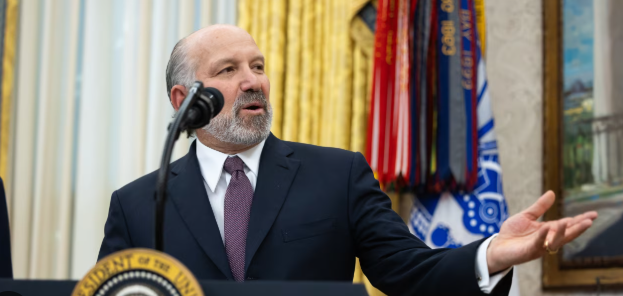A New FCC Era Under Brendan Carr
In November 2024, Brendan Carr was appointed Chair of the Federal Communications Commission (FCC), ushering in a leadership style poised to reshape telecommunications policy. Carr’s tenure at the FCC since 2017, coupled with his advocacy for deregulation and infrastructure modernization, sets the stage for significant industry shifts. His vision prioritizes expanding broadband access, streamlining regulations, and promoting U.S. leadership in 5G, creating both opportunities and challenges for telecommunications service providers (TSPs).
As the senior Republican at the FCC and a staunch advocate of reducing regulatory barriers, Carr’s leadership will likely impact the TSP stack, encompassing telco cloud, Cell-Stack automation, and OSS/BSS systems. For telecom providers, adapting to these changes is critical to optimizing customer engagement (CX), maintaining compliance, and leveraging emerging technologies like AI.
Net Neutrality: Revisiting a Controversial Policy
One of Carr’s hallmark stances has been his opposition to net neutrality regulations. These rules, reimposed by the Biden administration, classified broadband as a utility under Title II, ensuring equal access to internet services without prioritization or throttling. Carr has consistently argued that such regulations stifle innovation and investment in network infrastructure.
Telecom Implications:
- Service Customization: Deregulation may enable providers to offer tiered services, catering to specific customer needs, particularly in B2B markets.
- Risk of Consumer Backlash: Providers must tread carefully to avoid appearing exploitative, which could damage CX and brand trust.
- Operational Adjustments: OSS/BSS systems must adapt to support dynamic pricing models and service prioritization.
Spectrum Policy and 5G Leadership
Carr is widely recognized as a “5G crusader,” advocating for policies that enhance spectrum availability and reduce red tape in network infrastructure deployment. His track record includes reforms that accelerated the construction of high-speed networks across rural and urban communities, establishing the U.S. as a global leader in 5G.
Telecom Implications:
- Spectrum Allocation: TSPs must prepare for increased opportunities in mid-band and high-band spectrum auctions, which will drive telco cloud deployment and virtualized network functions (VNFs).
- Infrastructure Modernization: Expect streamlined permitting processes, reducing deployment costs and timelines for new infrastructure.
- Rural Connectivity: Enhanced focus on rural broadband expansion will demand scalable, hybrid solutions leveraging Cell-Stack automation.
Mergers, Acquisitions, and Market Consolidation
Carr’s appointment is likely to create a more favorable regulatory environment for mergers and acquisitions in telecom. By narrowing the FCC’s public interest standard, Carr could expedite approval processes for consolidation, potentially reshaping the competitive landscape.
Telecom Implications:
- Service Diversity: Consolidation may enable TSPs to expand service portfolios, enhancing CX with integrated offerings across broadband, mobile, and satellite services.
- Compliance Challenges: Mergers require robust OSS/BSS integration to maintain seamless operations and customer experiences during transitions.
- Market Strategy: Smaller providers may need to adapt by forming strategic alliances or focusing on niche markets to remain competitive.
AI and Customer Engagement
Carr has championed voluntary industry standards over strict federal AI regulation, encouraging innovation while emphasizing transparency. For TSPs, this approach presents an opportunity to leverage AI in transforming CX and operational efficiency.
AI Applications in Telecom:
- Predictive CX: AI-driven analytics can anticipate customer needs, reducing churn and enhancing satisfaction.
- Proactive Issue Resolution: Automating common queries and detecting service disruptions in real time can improve customer loyalty.
- Ethical AI: Providers must prioritize fairness and transparency in AI algorithms to maintain regulatory compliance and consumer trust.
Expanding Broadband Access
Carr’s focus on broadband expansion through initiatives like SpaceX’s Starlink network underscores his commitment to bridging the digital divide. His policies will likely emphasize public-private partnerships and innovative technologies to extend connectivity to underserved areas.
Telecom Implications:
- Rural Deployment: Providers must leverage telco cloud and distributed network overlays to deliver cost-effective solutions in remote regions.
- Funding Opportunities: Public-private initiatives may provide financial incentives for infrastructure projects, requiring detailed compliance tracking.
- Scalability: TSPs must adopt scalable solutions to balance rural connectivity demands with urban network upgrades.
Preparing for a New Regulatory Landscape
Carr’s appointment signals a shift toward pro-industry policies, but telecom providers must balance innovation with accountability. By embracing advanced technologies, streamlining operations, and prioritizing CX, TSPs can thrive in this evolving environment.
Actionable Strategies for TSPs:
- Invest in Automation: Use Cell-Stack to optimize resource management and service delivery.
- Enhance Transparency: Develop clear communication strategies to maintain customer trust amid regulatory changes.
- Leverage AI: Expand AI applications for predictive analytics, personalized CX, and operational efficiency.
- Stay Agile: Adapt quickly to new spectrum opportunities and compliance mandates with robust OSS/BSS systems.



